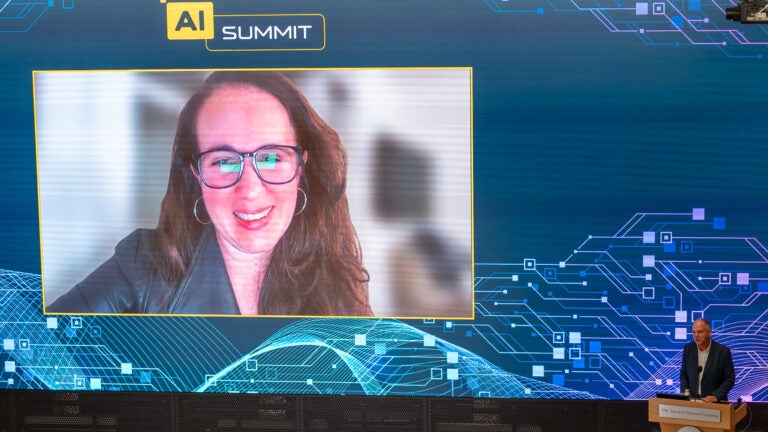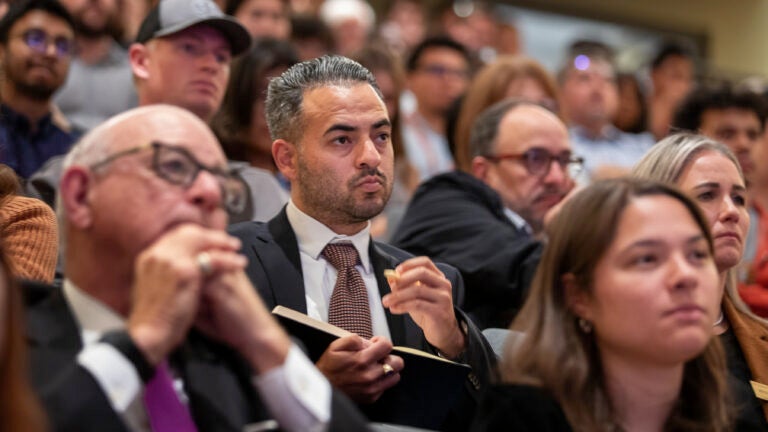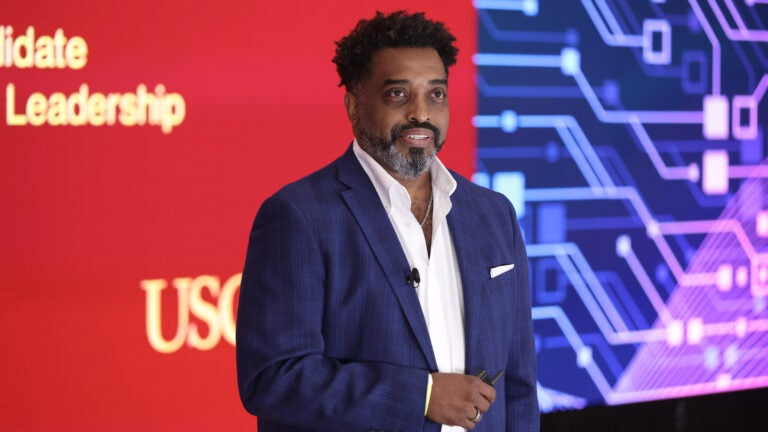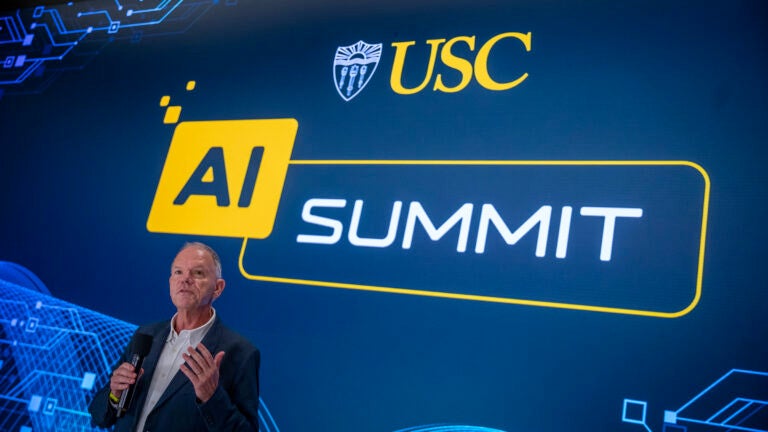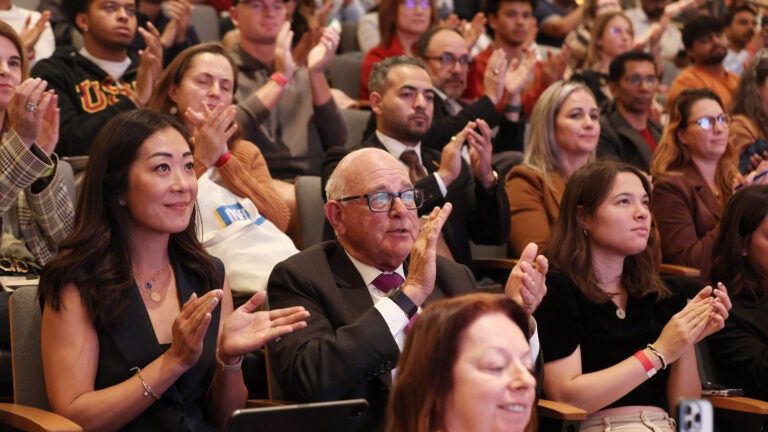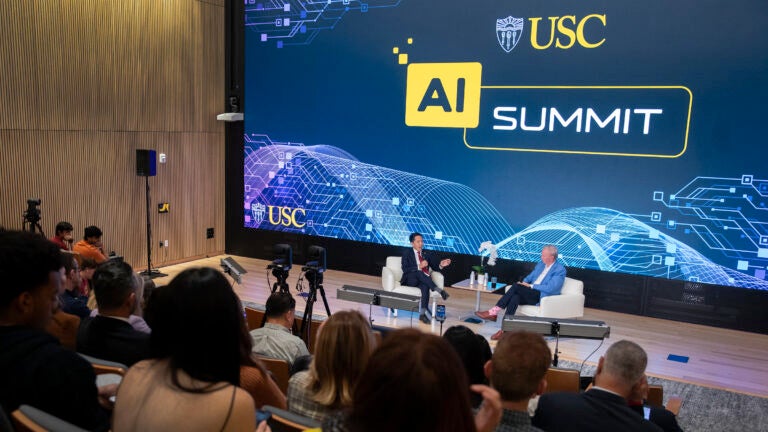
USC Interim President Beong-Soo Kim speaks with Eric Schmidt, former chairman of CEO of Google, at the USC AI Summit. (USC Photo/Brian van de Brug)
Wide range of application for artificial intelligence is focus of inaugural USC AI Summit
The event featured business leaders along with faculty, staff and student presentations and a conversation with former Google CEO Eric Schmidt.
On Tuesday afternoon, attendees gathered on USC’s University Park Campus to better understand how AI interacts with education, business and creativity at the inaugural USC AI Summit. Whether discussing entirely AI-created short films or virtual audiences for testing marketing strategies, Tuesday’s summit presenters demonstrated AI’s wide reach.
The three-hour event filled the 300-seat auditorium at the Dr. Allen and Charlotte Ginsburg Human-Centered Computation Hall, as well as much of the adjacent amphitheater and reception area — where the summit was livestreamed on several large TVs — and culminated in a major announcement for the university from Geoffrey Garrett, dean of the USC Marshall School of Business.
Garrett, joined virtually by OpenAI’s Vice President of Education Leah Belsky, announced an institutional-level agreement between USC and OpenAI for all students, faculty and staff to receive complete access to OpenAI’s advanced models like GPT-5 through ChatGPT Edu, a version of ChatGPT designed for academic institutions.
“I often get asked the question, ‘Is AI hype or reality?’ I think the answer is, reality,” Garrett said. “Is there an AI bubble? Maybe, but it’s going to take a long time for that one to blow up and potentially get popped. Is this [a] revolution for higher education? It feels like it to me, so let’s do it together.”
The USC AI Summit also featured presenters from across the university along with industry pioneers — including former Google CEO Eric Schmidt in conversation with USC Interim President Beong-Soo Kim — who gave real-world examples of AI’s power and promise. AI is one of Kim’s signature priorities; he announced the formation of the President’s AI Strategy Committee last month.
Garrett noted that the deal with OpenAI was finalized only an hour before Tuesday’s event. There are currently roughly 37,000 active ChatGPT users at USC; the new agreement will provide even more people with access to the program and some of the more advanced AI models.
Story continues below photo gallery
“We do have a responsibility to all of our students to make them super-users of these tools,” Garrett said. “Today’s not the beginning of the end of our AI year at USC — it’s really a kickoff event, and the idea behind the event was to galvanize, inspire and integrate the whole USC community.”
“Recent studies show that more than 70% of leaders would now rather hire a less experienced candidate with strong AI skills than someone with more traditional experience but no AI skills,” Belsky said. “And roles that require AI skills carry an average wage premium of about 56%. So there are real learning reasons, real education reasons and very real job-market reasons for students to build these skills. And the best way to do that is in community — working alongside top professors across disciplines. This is going to be the start of that journey.”
Garrett also emphasized that the agreement ensures data privacy will be under institutional control and will be in full compliance and alignment with USC’s data governance strategies. Trojans’ data will always remain protected, and OpenAI will not use that data in model training. For those in health care, the offering will also have safeguards in place to support HIPAA compliance.
At USC AI Summit, a sit-down with Schmidt
One of the most anticipated segments of the summit was the conversation between Kim and Schmidt about the pros and cons of AI in higher education.
“I’m always pro-AI, and the reason is that the arrival of a new form of intelligence that’s at the peer level of humans — this is roughly what’s happening — is a very big historical thing,” said Schmidt, who currently serves as the executive chairman and CEO of Relativity Space, an aerospace manufacturing company. “This is like the arrival of electricity — maybe even more so.”
Universities, Schmidt said, know how to adapt better than other sectors. He pointed to USC’s innovative approach to using AI and the minor in artificial intelligence applications at the USC Viterbi School of Engineering.
“Universities are going to adapt as universities do — 18 of the top 20 universities in the world are in the United States,” Schmidt said. “It’s one of the greatest things about America.”
However, Schmidt said he worries about extending AI into politics and the democratic process. He believes that type of decision-making power should remain with the electorate.
“I’m very worried that people will say, ‘Let’s have the AI do it. After all, it’s smarter than we are. It can figure things out. It can regulate us,’” Schmidt said. “That is a loss of human dignity that I’m very worried about.”
USC and AI literacy
Much of Tuesday’s summit was filled with Trojans from the student, faculty and staff ranks presenting their own research into AI usage.
“I’ve been excited [for this event], and I was texting some of my friends during the presentations about the exciting things that are happening with AI,” said Jonathan Haile, a fourth-year computer science and business administration major at the USC Viterbi School of Engineering who was in the audience. “They followed up with me and asked me to let them know about future AI events, or just any advancements in technology summits — I’m just super happy and grateful to be a part of the inaugural one.”
In one presentation, USC business librarian Benjamin Hall talked about the transformative impact of AI, particularly ChatGPT, on research and information consumption. Hall said that many students trust AI outputs as objective, unaware of the algorithms shaping their information. Because of that, many university libraries have adopted AI subscriptions and created tutorials and workshops.
“These new literacies require all of us working together to teach students not just how to use AI, but when to interrogate it,” Hall said. “We are all co-learners here. No one has mastered AI literacy because AI itself keeps changing.”
USC AI Summit: The multitudes of AI
In another presentation, Inderbir Gill — chair and Distinguished Professor of Urology with Keck Medicine of USC — discussed the development of AI-driven clinical reasoning agents to automate mundane tasks in clinics, aiming to reduce physician burnout. By automating tasks like collecting patient history, data extraction and note generation, Gill said each physician can save about seven to 10 minutes per patient.
“This is the beginning, I feel, of the way medicine is going to be practiced going forward,” said Gill, who added that the AI technology has shown a 59% superiority in clinical notes. “I’m really looking forward to this new era where the physicians are interacting with the patients at the highest level, and the mundane scribe-like work is automatically taken care of for us.”
In terms of the benefits of AI for society, USC Viterbi Associate Professor of Industrial Systems Engineering and Computer Science Phebe Vayanos talked about the work at the USC Center for Artificial Intelligence in Society. The center collaborates with community partners to develop AI solutions for societal challenges. Some of CAIS’ projects include an AI-driven vulnerability risk prediction tool for homelessness, optimizing prescribed burn locations in Yosemite National Park and mitigating military suicide.
“Over the last decade, we have grown from being just a handful of researchers with an almost utopic vision to an interdisciplinary research center bringing faculty from across campus together to solve these important challenges,” Vayanos said. “More than anything, though, we’re a community of researchers with a shared vision and passion that we aim to instill in our students.”
Ron Guerrier, a doctoral candidate in the USC Rossier School of Education, shared Vayanos’ sentiment about using AI for the betterment of society. In his presentation, Guerrier — a former chief information officer with Toyota and HP — advocated for AI governance, transparency and inclusion, and called for a “Hippocratic Oath” for AI to ensure it does no harm.
“The future is ours to write, and the key there is to do it together,” said Guerrier, who also serves as chief technology officer for the nonprofit organization Save the Children U.S. “As I look at this audience, I love it. It’s diverse with mindset and experiences, and I really would love to make sure that we have that embedded in our AI.”
Likewise, Haile felt a sense of excitement as Schmidt and other speakers emphasized what a great opportunity it is for current students to be in college as these new technologies emerge.
“A lot of what Eric mentioned in his talk with the president is that scalable AI is something that students should look into, and how this is the best time to learn,” Haile said. “It’s not just about using AI but also making sure to maintain the critical thinking component and not just being complacent in the way we use it. [We should] use it to explore the potential of our education.”

